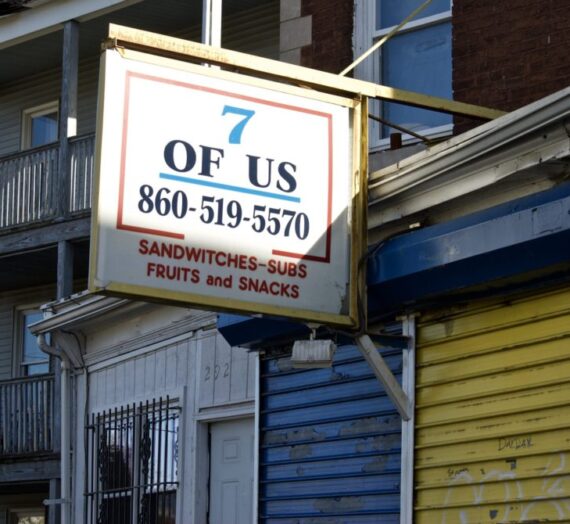 Try ignoring dozens of sunflowers towering over you.
Try ignoring dozens of sunflowers towering over you.
Neither could Mayor Segarra nor Governor Malloy while talking about how arts and cultural institutions have shown themselves as assets to the economy. Segarra said that being at events where there are fresh flowers and vegetables make him a “happy mayor”; Malloy reminisced about the sunflowers that bent under their own weight, which he saw on his last vacation before taking office as governor.
On Wednesday afternoon, they, along with Cary Wheaton (Executive Director of Billings Forge Community Works) and Elizabeth Hucker (Director of Community Investment with the Greater Hartford Arts Council) addressed a small gathering on the green in front of the community garden beds at Billings Forge on Broad Street. A few gardeners tended their plots while all this was happening a few yards away.
Malloy has been making stops across Connecticut on his “Jobs Tour.” The purpose of this stop was to discuss the economic impact of the arts, specifically, how the Hartford Arts and Heritage Jobs Grant Program has been successful.

Billings Forge was just one of the grant recipients, but is a strong example of how this is not a wasted investment.
Wheaton described the evolution of Billings Forge and its many offerings. She talked about the Mashup event, which she said is a quarterly “buffet,” featuring events all day, ranging from food tastings to dance to music to Catie Talarski’s popular Radio Adventure Theater. This “sounds like Boston or New York” but all those offerings, she said, were right here. The farmers’ market, held on Thursdays, was the first in Hartford to accept EBT and SNAP, and it was opened to address the issue of food security in the Frog Hollow neighborhood. The Hartford Arts & Heritage Jobs Grant, Wheaton said, was “essential” to the success of Billings Forge.
In the audience were people representing many of the city’s arts and cultural organizations, like Real Art Ways, Wadsworth Atheneum, La Paloma Sabanera, and Hartford Children’s Theatre. Mayor Segarra thanked the governor for his support of the arts in spite of fiscal challenges.
Governor Malloy called this stop a “celebration of what is a great success” in Hartford. He explained a little about the Jobs Tour, saying “we’re tryin’ to get our state going again,” after years of stagnation in terms of job creation. In talking with people, he said, “we’re hearing very interesting things” about why the state has not been faring so well. Connecticut and Michigan are at the bottom of the list for job creation.
Often, the arts are dismissed outright, thought of as a public exercise in navel-gazing. They can be. But they also employ people. Segarra noted that nonprofit arts generates over $244.1 million in our local economy. “Spending on arts in Hartford,” Hucker said earlier, “creates more jobs than any other sector in the region.”
 Although arts is our strength, Malloy said that we need to grow across several sectors: culture, tourism, and hospitality. He remarked that we see advertisements for other regions, but that we do not market ourselves well as a state.
Although arts is our strength, Malloy said that we need to grow across several sectors: culture, tourism, and hospitality. He remarked that we see advertisements for other regions, but that we do not market ourselves well as a state.
When Kimberly Reynolds, the Director of Institutional Advancement at the Wadsworth Atheneum, asked about long term strategy and how the arts organizations can play a role, the governor acknowledged her, but his response never seemed to answer the questions. Instead, he discussed what he views is a need for developing a sustained and consistent “message” with which to market Connecticut. He made quick mention about how “we’re under more competition than ever” when it comes to the gambling industry, which seemed oddly placed in a conversation largely about how the Hartford Arts and Heritage Jobs Grant Program has benefited the state’s economy.
Jobs Grant Program has benefited the state’s economy.
Not all questions went unanswered, however. When it was requested that First Lady Cathy Malloy perhaps make an appearance as a way to help out the Hartford Children’s Theatre, the governor feigned being hurt by rejection. After talking about his series of minor roles in various productions, he said that if they need “a life-size rendition of Tinker Bell,” he’d be up for it.
A tour of Billings Forge followed the question and answer session.
